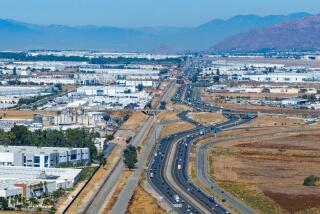Research Park May Fill Void at CSUN
- Share via
Changing course after their controversial retail development plan fizzled in September, CSUN officials said Friday they now hope to turn the North Campus property into an office and research park for biotechnical and biomedical companies and entertainment production facilities.
A third of the 65-acre parcel will be preserved for athletic facilities and the University Village housing complex, said Cal State Northridge President Blenda Wilson.
“We are not now considering hotels and retail and all kinds of things,” Wilson said after a vote by the board of the North Campus/University Park Development Corp. Instead, the board, over which she presides, directed CSUN consultant Frank Wein to scout out interested biotech, biomedical and entertainment companies. He is to return with a report in about a month.
Wilson said the new direction meets the criteria set forth by CSUN Chancellor Barry Munitz, who has since resigned to head the new Getty Museum.
Munitz sought a master plan that provided stable revenues, offered academic linkages and was compatible with the community. It was he who asked Wilson to withdraw the retail plan just before she was to present it at a university Board of Trustees meeting in mid-September.
Munitz said the proposed project, University MarketPlace, was insufficiently profitable to justify a long-term lease of university land.
By then, it had been pared down considerably to meet objections from neighbors, and would have brought in just $384,484 a year.
The new proposal would generate about $2 million to $3 million annually, said Art Elbert, CSUN director of finance.
The retail project was unpopular with just about everybody--from residential neighbors to local retailers fearful of competition.
On-campus critics complained that although the shops would employ a few hundred students, the development had no substantial linkage to the university’s academic mission.
The partnership with biotech and biomedical firms, in contrast, is rife with potential and would offer students and faculty in several disciplines ready access to research facilities, officials said.
Ancillary production companies, such as those that do digital animation and special effects, would offer similar linkages to CSUN’s film and television department.
It is too soon to know how many, if any, traditional sound stages might also be built on the entertainment portion--or south end--of the property, which faces Devonshire Street west of Zelzah Avenue.
The biotechnical and biomedical companies would be grouped on the north third of the property, which was formerly farmland called Devonshire Downs.
Decisions about the middle acreage, where the football stadium is located, depend in part on the work of a committee studying what to do about CSUN’s indebted athletic department. Wilson moved to cut several varsity men’s teams earlier this year for lack of funds.
Aside from the benefits to the university, Elbert said providing land for cutting-edge technology firms would “also serve as a catalyst or economic stimulus to economic development in this part of the Valley.”
Interest in relocating to North Campus has already been expressed by two firms in Sylmar that have the same owners, Advanced Bionics and Mini-Med.
Wilson also predicted the lower-density new plan would not be met with the uproar created by the University MarketPlace concept.
At least one critic of the former proposal, a local homeowner leader and retired CSUN administrator, liked what he heard at the meeting.
“I strongly support the tenor of this conversation,” said Ed Peckham, who called the new direction taken by the board, “a wonderful opportunity for the real development of the North Campus.”
More to Read
Inside the business of entertainment
The Wide Shot brings you news, analysis and insights on everything from streaming wars to production — and what it all means for the future.
You may occasionally receive promotional content from the Los Angeles Times.










